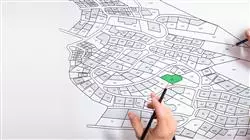University certificate
The world's largest faculty of engineering”
Description
Analyze the most outstanding examples of self-sufficient, biophilic or sponge cities to gain a unique perspective on the future challenges of Urban Infrastructure"

In order to understand and advance in the Strategic Urban Infrastructure Planning, it is necessary to contextualize the current situation of urban development. The cities of the future and present have to adapt to goals such as the Sustainable Development Goals, the Urban Agendas or UN-Habitat. Professionals and engineers with advanced skills in this area will have a clear advantage to lead the most ambitious urban projects.
TECH has assembled a team of experts in the planning and execution of urban infrastructures. Their extensive knowledge has enabled the development of a concise program that provides a detailed update on planning, urban green infrastructure and advanced monitoring of livability, resilience and quality of life. With all this set of knowledge and tools, the graduates will provide a quality value proposition that will position them as a reference professional in their field of action.
In addition, being aware of how complicated it can often be to combine academic responsibilities with personal and work responsibilities, TECH has programmed all the content 100% online. Students do not depend on fixed schedules or the obligation to attend classes, but can decide at any time how to take the program, being able to download all the content from the Virtual Campus itself.
Download all the material you will find in the Virtual Campus and study it at your own pace, with no ties or obligations"
This postgraduate diploma in Strategic Urban Infrastructure Planning contains the most complete and up-to-date program on the market. The most important features include:
- The development of case studies presented by experts in Design of Sustainable Green Infrastructures
- The graphic, schematic, and practical contents with which they are created, provide practical information on the disciplines that are essential for professional practice
- Practical exercises where self-assessment can be used to improve learning
- Its special emphasis on innovative methodologies
- Theoretical lessons, questions to the expert, debate forums on controversial topics, and individual reflection assignments
- Content that is accessible from any fixed or portable device with an Internet connection
You will have at your disposal a large amount of high quality multimedia material, with videos in detail and complementary readings for each topic covered"
The program’s teaching staff includes professionals from the sector who contribute their work experience to this educational program, as well as renowned specialists from leading societies and prestigious universities.
Its multimedia content, developed with the latest educational technology, will provide the professionals with situated and contextual learning, i.e., a simulated environment that will provide an immersive education programmed to learn in real situations.
The design of this program focuses on Problem-Based Learning, by means of which the professionals must try to solve the different professional practice situations that are presented throughout the academic course. For this purpose, the students will be assisted by an innovative interactive video system created by renowned experts.
Study the technology behind planning and data collection in sustainable cities, delving into the most advanced Big Data and Machine Learning"

Lean on the experience of the entire teaching staff, made up of true leaders in Strategic Urban Infrastructure Planning "
Objectives
The design and restructuring of today's cities towards more environmentally friendly models requires strategic planning that encompasses the necessary complexities and processes. This postgraduate diploma focuses precisely on the most current techniques, monitoring and planning to give the student a unique perspective, with which to lead ambitious plans for smart cities and green infrastructure development.

You will improve your own methodology for tracking indicators and monitoring based on the most current applied technology"
General Objectives
- Provide a rationale for the current context of sustainable urban development
- Analyze the main global reference strategies for Sustainable Urban Development
- Protecting and promoting Urban Biodiversity
- Communicate through visualization of good environmental management
- Analyze different nature-based solutions as city transformers
Specific Objectives
Module 1. Strategic Urban Infrastructure Planning
- Determine the aspects and objectives on which green infrastructure has the greatest impact on the sustainable development of towns and cities
- Develop the different strategies and initiatives for sustainable development at a global level
- Analyze the concept of Urban Sustainability
- Explore the main objectives and challenges of sustainable urban development strategies
- Examine the objectives of sustainable development most closely linked to urban development, cities and green infrastructure
- Assess the different experiences implemented by city networks and reference cities at the global level
- Raise awareness and empower students in the field of sustainable urban development
Module 2. Strategic Green Urban Infrastructure Planning
- Analyze the key concepts in strategic planning of green infrastructure, within the existing policy or regulatory framework and possible scenarios
- Develop the possible phases necessary to carry out strategic planning, ranging from objective setting, information gathering and analysis, participation, situation diagnosis, action plans to monitoring and evaluation or communication
- Demonstrating the effectiveness of strategic planning through real-life success stories
- Connecting natural capital and consolidating urban green infrastructure
- Rethink investment and management towards models based on sustainability and the fight against climate change
- Encourage participation. Implement in the management itself the processes that promote citizen participation and involvement in the development of the city's green infrastructure
- Advance in the rebalancing of the city's green infrastructure, establishing a system of dynamic diagnosis of the city's green infrastructure to derive strategic proposals that correct imbalances, identify opportunities and enhance the differentiating values of the neighborhoods and promote new centers
- Periodically evaluate the actions proposed in the plan with a commitment to address the results with actions
- Improve communication and awareness and guarantee citizens' right of access to information related to green infrastructure
Module 3. Monitoring and Tracking of Indicators and Technology Applied to Sustainable Urban
- Generate specialized knowledge on technologies for the development and monitoring of indicators
- Establish strategies for prioritizing actions based on indicators
- Analyze environmental impacts on cities and the need to have objective data to improve them
- Determining the system of indicators best suited to the improvement objective being pursued
- Elaborate a good prior diagnosis based on indicators to be successful in the elaboration of strategic plans
- Examine the different categories of indicator groups
- Substantiate the Smart City as an example of technology incorporation for the improvement of quality of life
- Evaluate existing data visualization and analysis systems
- Analyze the potential of Earth Observation data for the generation of Urban Sustainability indicators

Propel your career into the most ambitious public and private spheres, where you will be able to develop advanced strategic plans in urban infrastructure"
Postgraduate Diploma in Strategic Urban Infrastructure Planning
The strategic planning of urban infrastructures aims to develop a long-term vision for the sustainable development and growth of cities and urban communities. This planning involves the assessment and analysis of the city's current and future needs in terms of infrastructure, including transportation, water, energy, communications, and information technology.
Proper strategic planning of urban infrastructure requires the participation of various stakeholders, including local government, private entities, local communities, and infrastructure experts. These stakeholders must work together to identify the city's needs, define objectives and goals, and create a comprehensive plan with specific strategies and actions to achieve them.
It is important to mention that strategic planning for urban infrastructure should consider aspects such as sustainability, social inclusion and resilience to natural disasters. It should also be in line with urban development plans, and in many cases should be regularly updated and adapted as the city evolves and community needs change.
Strategic urban infrastructure planning is critical to the sustainable development of cities and urban communities. It requires the active participation of multiple stakeholders and a long-term approach to address the current and future needs of the city.
Students of the program will be trained for strategic planning of urban infrastructure, develop as advisors and consultants for governments, businesses and non-governmental organizations. In addition, these experts can contribute significantly to the creation and development of sustainable and efficient urban infrastructures that improve the quality of life of urban communities.







